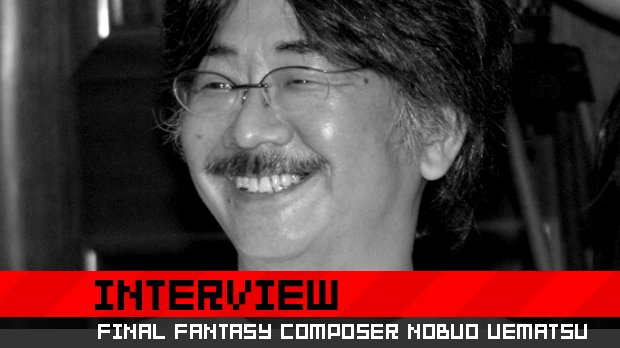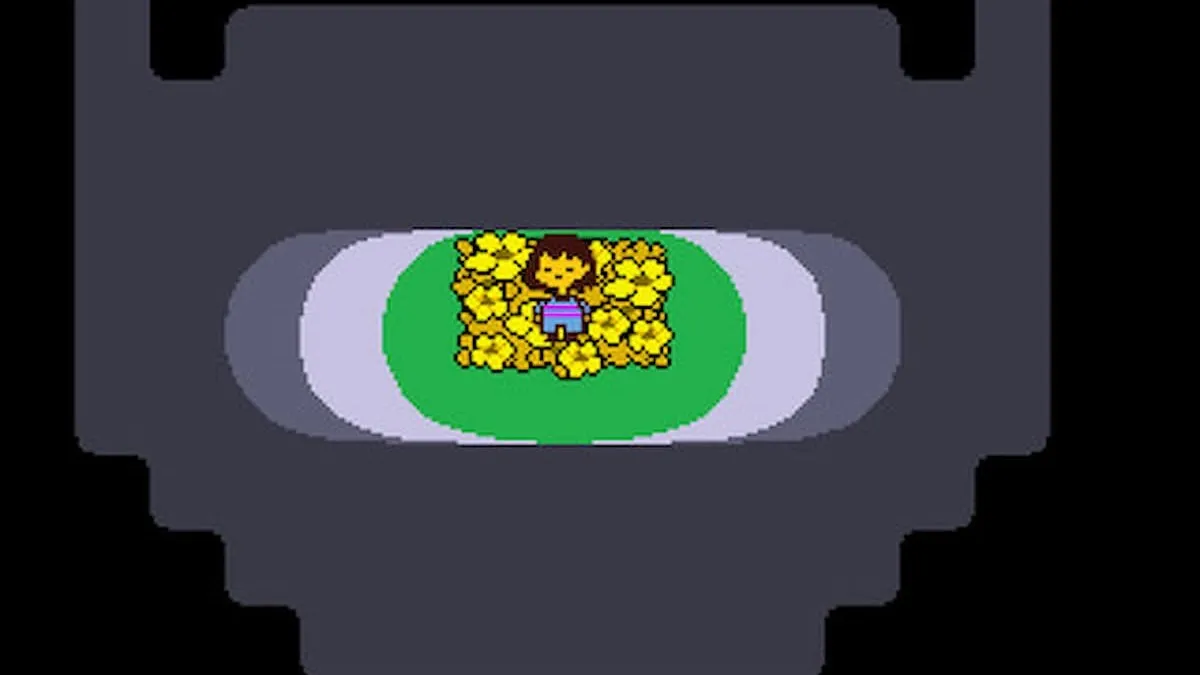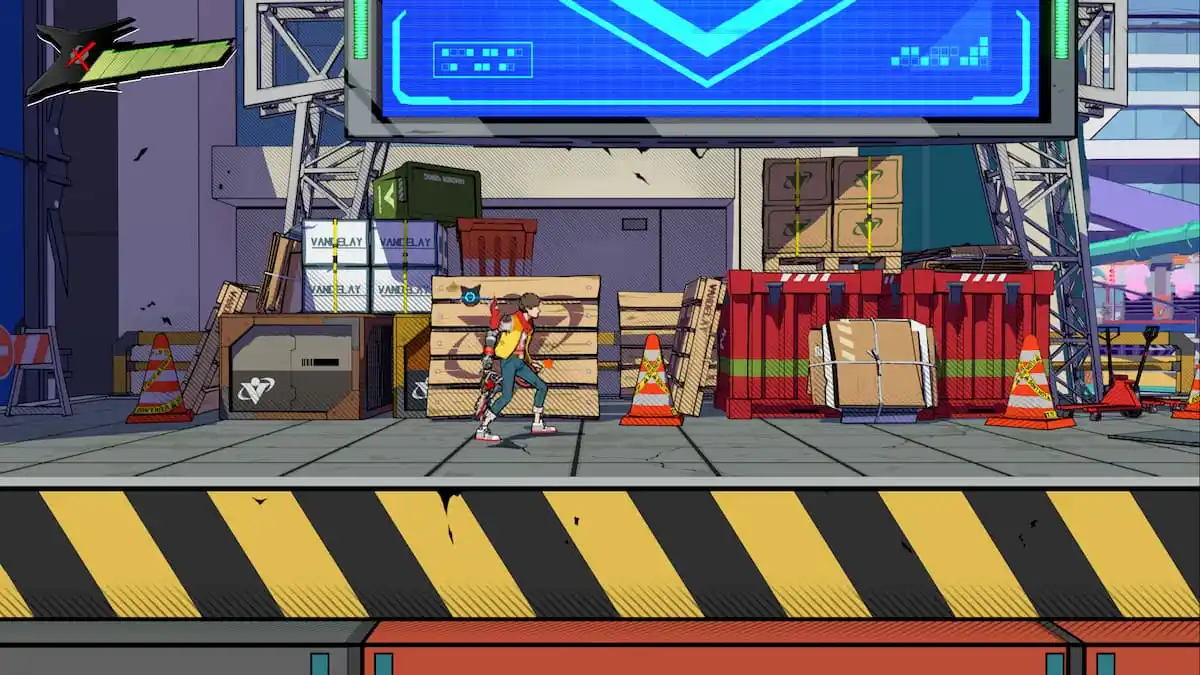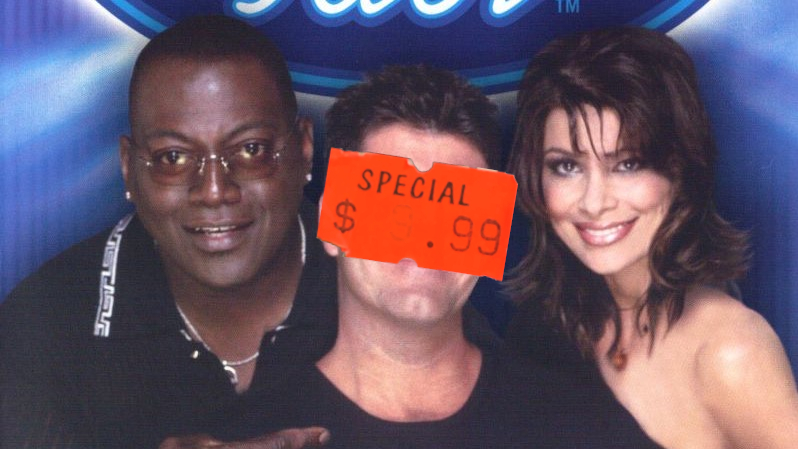Both Colette Bennett and I had the honor of meeting and interviewing Final Fantasy series composer Nobuo Uematsu, who was joined by Distant Worlds conductor Arnie Roth. The pair took time out of their busy schedule in the middle of preparing for their next concert in Grand Rapids, Michigan to talk to us about games, music making, boss battles, concertgoers and more.
The interview gradually becomes unconventional, as we chat with the famed composer about beer, business men, and the best moves from Final Fantasy VII to have in your personal arsenal. Luckily enough, he didn’t think we were totally crazy. In fact, it seemed as if he was glad to play along.
I have to admit that it was hard for both of us to remain professional, as we are both huge fans of the 20 year game music veteran. Fortunately, Uematsu is an easy-going, fun-loving guy who, now that I think about it, could probably see right through us. He knew we were gaming geeks. Regardless, we had fun.
Read on for the full interview with Nobuo Uematsu.
Colette: Do you watch or play the games you compose music for before you come up with the music? Or do you just go on art and imagine the story from there?
Uematsu: I would like to compose the music when the game is already done, but, unfortunately, it takes a long time, so I can’t wait until the end. I wait for the character designs and concept art. I see a plot or scenario and go from there.
Dale: After they’re completely done, do you play through the games you’ve worked on to see how they came out?
Uematsu: Of course. [laughter]
Dale: Have you played all of them? All the Final Fantasy titles?
Uematsu: I’ve only played up until Final Fantasy XI. Not XII yet. Most of them.
Colette: Your newest project is scoring the Guin Saga anime. Have you always been interested in scoring anime? If so, would you like to score more after this one? Also, how close to completion are you?
Uematsu: I’ve done game music for twenty years. I’ve been so busy that I didn’t even have time to think about anime music. The anime is already done, and releases in April in Japan.

Colette: Considering the success of concerts like Dear Friends, do you think an event such as the orchestral pieces from Lost Odyssey or the Blue Dragon event that was held in Tokyo could be successful in the United States? I’m a huge fan of Lost Odyssey.
Uematsu: [In English] Thank You.
Arnie Roth: We were just talking about that, how it would be fun to put together. I’ve, of course, been involved in other compilation concerts — Play, and others like that — but one that would just be Lost Odyssey … really, part of that answer is does the business sense work? Can you make the dollars and cents work? That’s part of it. Clearly there’s enough music to do. Look at Final Fantasy. Look at the huge book of repretoire. We’re in the process right now of looking at new pieces that we haven’t played yet. There’s so much more in that series that we haven’t touched.
But yes, it would be wonderful to do that. We’re looking at a lot of different new projects, like what would be the next phase after Distant Worlds. How would Final Fantasy metamorphose into something new? And maybe other combinations with other composers. I’ve been involved with other composers, for instance Chris Huselbeck and the Symphonic Shades concert, other things like that. It’s always fascinating to see the variety.
Dale: Mr. Roth, you’ve kind of become this go-to guy for game music concerts. Did you just fall into that? How did that really come about?
Roth: I hate to say it, but I suppose that I really just fell into it. I think there’s a combination of things, though. I think that working with many artists in many genres and styles, as well as film and videogame and CD production, I think pulling that all together, plus the arranging and orchestrating, working with pop artists, classical artists, ballet…I think it’s useful for videogame music to have a wider background.
I complain about music education in the United States. There tends to be this tunnel vision. There’s this very old repertoire that all conservatory and music students have to learn. Unfortunately, the same bad habits keep perpetuating itself, generation after generation. We’re not expanding. From when I went to school to now, when my kids are going to school, I look at the curriculum and it’s the same! It’s the same as 20 years ago. There’s nothing new there.
Concerts like this, along with the real world experience of working with pop artists as well as classical artists, when you bring all of that together, I think you can bring something more exciting to those concerts than perhaps people that are entrenched in that narrow tunnel.
At the concert tonight, you’ll hear what Nobuo-san and I were announcing at the end of the Minneapolis concert. We are thinking about adding songs. Fans always write in asking for songs like “Dancing Mad” and others. We announced to the crowd on Saturday night that we would add by the end of the year at least a few new pieces of music that will be in the battle scene genre specifically. We gave them a choice of five pieces that Nobuo-san and I narrowed down — because there’s hundreds of pieces — we gave them five to vote on by shouting.
Dale: What song would you feel was at the top of the voting?
Roth: “Dancing Mad,” and “Jenova.” Those two. “Fight with Seymour” was one. “Clash on the Bridge” was another. “Force Your Way” was the last. We want the fans to be involved in the decision process.
I would say that we couldn’t get it ready until maybe 4th quarter of this year. We have a lot of concerts between now and then over the globe. By August or September, or after that point, we’ll do that.
Dale: You should have an organist for “Dancing Mad.”
[pause]…[group laughs]
Dale: I’ll do it! [laughter]
Uematsu: Do you play organ?
Dale: I’m terrible, but I’ll learn!
Roth: Let me tell you, that’s a difficult song.
Uematsu: Between Final Fantasy and these two, there’s already a huge difference between sales and popularity. But there’s a lot of interesting and fun songs in these games, so if you want me to make this a big hit here, I’d love to do it.
Uematsu: How about if we do half Final Fantasy and half Blue Dragon?
Dale: That would be the best!
Colette: I read that you actually visited European castles for inspiration for Final Fantasy IX. Is this something you frequently do in the early stages of composing a score, that is, visit places that correspond to the theme of the score you’re writing?
Uematsu: I’d love to do this every time I get an opporutnity. When I was making Final Fantasy IX‘s music, I was on a two-week vacation, so I took the time to visit Europe and take in inspiration for the soundtrack. Usually this isn’t the case.
Colette: The song “One Winged Angel” is very popular among game music fans, as is the character Sepithroth. Did you ever think you were writing such an important piece of music when you composed it. Why do you think fans focus on that particular piece of music so much?
Uematsu: I don’t know why it had the effect it did. Obviously, every time you make music, you won’t know what the outcome is going to be. I didn’t know it would be that dynamic. I compose on a computer, and in this case I experimented with several ideas, putting them together and trying different things. When I’m writing, I’m actually making music in the computer. I’m not actually thinking about the orchestration when I’m only focused on composing. Does it sound weird to you?

“One Winged Angel” plays here.
Colette and Dale: No, not at all!
Uematsu: I had Sephiroth in my mind when I started creating the music, so the song revolves fully around the image of him.
Colette: What is your favorite piece of music that you’ve composed in the last year?
Uematsu: The last battle for Lost Odyssey, though I don’t know what the title of that song would be in English. But that was probably longer than a year ago, so I’ll have to say the grand opening of Guin Saga that plays in the show’s beginning. Do you want to listen to it? I have it here.
[music is cued up on a notebook computer]
This is the first time this will be played in the US.
Colette: So beautiful! I thought of this while hearing that: I’ve actually read the Guin Saga books, but if I hadn’t, I would want to see the series just based on hearing that music. Do you feel like your music could bring fans to enjoy a medium of entertainment that they haven’t noticed before?
Uematsu: I would love for people to hear my music and then have interest in the related book or media.
Colette: I’m looking forward to a fourth album from the Black Mages, if it’s coming. We wanted to ask if that’s something that we could look forward to, and if the Black Mages would ever consider playing music that’s not from Final Fantasy.
Uematsu: The Black Mages have only been releasing albums every two or three years. In the next three years we don’t even know if we’ll be alive. [laughter]
Among the members there are a few who want to play something other than Final Fantasy music, but the name Black Mages is owned by Square Enix, so that’s kind of difficult.
We’ve heard the idea that maybe we can change to name from the initials T.B.M. to something like Tokyo Business Men and just forget about the copyright and do what we want to do. [laughs]
Dale: And everyone would just wear black suits with black ties…
Colette:…and look tired
[loud laughter]
 The Black Mages.
The Black Mages.
Colette: Back in the days of the Nintendo, you created sounds exactly as the would sound to the user. Now, with CD quality music in games, do arrangers and orchestrators make your job any easier? Do you still feel like you have complete control in how the sound comes out in the end?
Uematsu: Now that I have more opportunity to help me out, like, if I’m working on something like jazz, I can ask a professional jazz musicians to arrange it. I’m not doing this because I want less work. I’m trying to expand the music.
Now it’s even better than before. Back in the day I would actually have to go somewhere to get someone to arrange it for me, and then get there to hear it. But it would be too late because it’s already being arranged. I can’t ask the person to change it. But now, because of technology, if I make something and ask somebody to arrange it, if I don’t like it, he gets it right back. I have better control now.
Dale: My favorite work of yours is “Dancing Mad.” Can you tell us what went into the creation of this song? What are the influences that went into this brilliant piece?
Uematsu: When Final Fantasy IV was being made, I knew that the game would be popular in Japan, but I also felt and sensed that people outside Japan were becoming more interested in the series. Everyone on the staff were very excited, and tensions were very high. I was doing any drugs or anything bad, [laughter] but because of this energy, I was able to make amazing pieces from beginning to end.
Colette: I have the same question for “To Zanarkand.”
Uematsu: I actually didn’t write that for Final Fantasy X. It was actually for a friend named Seo-san, who plays flute. She asked me to compose the song for a recital. I made it, but later thought that it was a little bit too gloomy. I decided to keep it for something later.
Later, when I was in charge of making music for Final Fantasy X, the staff was calling, asking where the music was. I said, “Okay, just take this one.” [laughs]
Colette: That’s a great story. I’m so glad I asked.
Dale: I heard that you make your own beer. [laughs]
Uematsu: [in English] Yes.
Dale: You’d have to be a pretty big fan of beer to make your own, right? What does it taste like? [loud laughter] What? I’d love to have a glass!
Uematsu: I think it’s really delicious. Have you tried making beer?
Dale: I’ve always wanted to, but never tried. What would you liken your beer to, brand wise?
Uematsu: It’s nothing like Japanese beer. It’s more of an ale. But my friend won’t drink it. [laughter]
Dale: Then he’s not a real friend.
Uematsu: He can’t be a real friend then.
Dale: Have you heard the numerous fan arrangements of your music out there on the internet? It’s kind of like our version of the Japanese doujin music scene. If so, what are your feelings on this music?
Uematsu: I’m honored. According to law, legally, it’s no good. Square Enix doesn’t like it [giggles], but I don’t mind. More people are listening and appreciating my music.
Dale: You told us before that you’ve played all the Final Fantasy games, specifically Final Fantasy VII. If you had a Limit Break, what would that be?
Uematsu: Dolphin Blow? [everyone looks at each other and laughs]
Or Cloud’s Omnislash?
 Omnislash!
Omnislash!
Dale: Mr. Roth, how did you first come to work with Uematsu? This was back in the Dear Friends days, right?
Roth: Back at the first performance at E3 in Los Angeles, it was producer Jason Michael Paul, who I knew from some other concert productions. What was interesting is that nobody in the United States believed at that point that Final Fantasy could be a concert. They thought that the E3 concert was around a convention, and that it couldn’t sell by itself.
Jason had been trying to get concerts in the United States but had no luck at all. He called me upset, saying that nobody wants to take this. Like a crazy person I decided to try it.
So we were the first ones to do a commercial concert this way, not connected to a convention or anything. And then I went on with the tour at that point, I was asked to do all the rest of the Dear Friends concerts. That was my first time working with Uematsu’s scores.
Dale: Initially, how did you feel going into videogame music concerts? Were you apprehensive?
Roth: No. As a conductor, looking at the scores and listening to reference tracks, I could tell the quality level of the orchestration and the music, so that part was of no question to me. Really, the stars of these shows are the orchestra, and its really meant to showcase the live performance of music by the orchestra. So for that reason, it works very well as a vehicle to bring new audiences in for orchestras.
Dale: We’ve heard from other orchestra players at other game music concerts that they were surprised that the music they were playing. Is that what you’re getting from your orchestras?
Roth: There’s no question. The comments are more about the quality of the scores. You have to understand that when orchestras play for pop artists, when they do what they call a crossover concert, they have a lot of whole notes. Not a lot of activity, and they’re not featured either — they’re in the background. That’s very different from what this concert is. The difficulty level and the spotlight level is on them as performers.
I remember when we did the Royal Stockholm concert for the first time. Every one of them could not believe the audience reaction or the quality of the scores. They really appreciate that. There’s a preconception that this is going to be like a pop concert, but it’s not, and they don’t understand that.
I don’t think that was the case at first. At the first, the Los Angeles concert, there were a couple of little comments, little quotes like “we shouldn’t be playing this.” I could never understand that. I worked with them. What went on there? But I’ve never had any issue. All of them are delighted with the scores and the audience response.
 Arnie Roth at work.
Arnie Roth at work.
Dale: Are you aware of the new type fans that attend these shows? The dreaded hummers? The ones that hum the songs all through the concert with every song?
[laughs]
Roth: No. That’s bad.
Dale: You don’t want to sit next to a hummer.
Colette: But you’re sitting next to me! [laughter from group]
Dale: You had better not hum!
Colette: I wanted to ask about Dog Ear because I really enjoyed the CellRhythm release. Will we see more releases coming from Dog Ear Records like that? Has that release been a success so far?
Uematsu: I am not into making J-pop kind of music. I want my releases to be unique, with my own style. Next year in March, I’m going to be releasing an album through this. You can download current releases of ours on iTunes. Can I advertise this?
Us: Yes!
____________________
Destructoid would like to thank Chris Szuberla at AWR Music, Hiroki Ogawa at Dog Ear Records, Arnie Roth and, of course, Nobuo Uematsu for this opportunity. We’re still embarassed about the karaoke!




